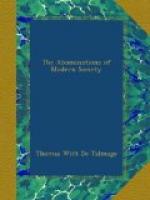This style of dissipation is the abettor of pride, the instigator of jealousy, the sacrificial altar of health, the defiler of the soul, the avenue of lust, and the curse of the town. The tread of this wild, intoxicating, heated midnight dance jars all the moral hearthstones of the city. The physical ruin is evident. What will become of those who work all day and dance all night? A few years will turn them out nervous, exhausted imbeciles. Those who have given up their midnights to spiced wines, and hot suppers, and ride home through winter’s cold, unwrapped from the elements, will at last be recorded suicides.
There is but a short step from the ball-room to the grave-yard. There are consumptions and fierce neuralgias close on the track. Amid that glittering maze of ball-room splendors, diseases stand right and left, and balance and chain. A sepulchral breath floats up amid the perfume, and the froth of death’s lip bubbles up in the champagne.
Many of our brightest homes are being sacrificed. There are families that have actually quit keeping house, and gone to boarding, that they may give themselves more exclusively to the higher duties of the ball-room. Mothers and daughters, fathers and sons, finding their highest enjoyment in the dance, bid farewell to books, to quiet culture, to all the amenities of home. The father will, after a while, go down into lower dissipations. The son will be tossed about in society, a nonentity. The daughter will elope with a French dancing-master. The mother, still trying to stay in the glitter, and by every art attempting to keep the color in her cheek, and the wrinkles off her brow, attempting, without any success, all the arts of the belle,—an old flirt, a poor, miserable butterfly without any wings.
If anything on the earth is beautiful to my eye, it is an aged woman; her hair floating back over the wrinkled brow, not frosted, but white with the blossoms of the tree of life; her voice tender with past memories, and her face a benediction. The children pull at grandmother’s dress as she passes through the room, and almost pull her down in her weakness; yet she has nothing but a cake, or a candy, or a kind word for the little darlings. When she goes away from us there is a shadow on the table, a shadow on the hearth, and a shadow in the dwelling.
But if anything on earth is distressful to look at, it is an old woman ashamed of being old. What with paint and false hair, she is too much for my gravity. I laugh, even in church, when I see her coming. One of the worst looking birds I know of is a peacock after it has lost its feathers. I would not give one lock of my mother’s gray hair for fifty thousand such caricatures of old age. The first time you find these faithful disciples of the ball-room diligently engaged and happy in the duties of the home circle, send me word, for I would go a great way to see such a phenomenon. These creatures have no home. Their children unwashed. Their furniture undusted. Their china closets disordered. The house a scene of confusion, misrule, cheerlessness, and dirt. One would think you might discover even amid the witcheries of the ball-room the sickening odors of the unswept, unventilated, and unclean domestic apartments.




